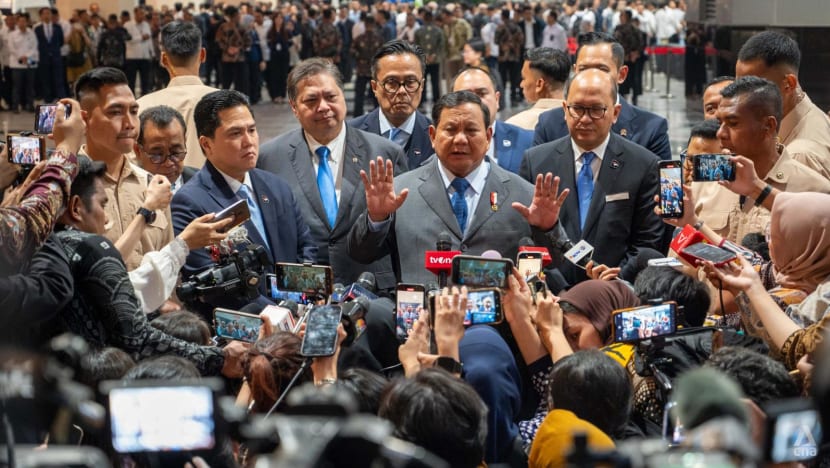Indonesia’s new sovereign fund to boost state-owned enterprise assets, forge global ties: CIO
JAKARTA: Indonesia’s second sovereign wealth fund, Danantara Indonesia, is positioning itself as a catalyst for transforming state-owned enterprises (SOEs) into competitive entities, while drawing in foreign partnerships, its chief investment officer Pandu Patria Sjahrir told CNA.
The new sovereign fund was launched on Feb 24 to manage the assets of all state-owned enterprises in the country worth more than US$900 billion.
It is Indonesian President Prabowo Subianto's main vehicle to achieve his 8 per cent economic growth target by 2029.
At the launch, Prabowo said Indonesia is ready to collaborate with both local and foreign partners to make Danantara a success story. He added that the fund is a step towards bringing Indonesia to a developed country status.
Its creation, though, has sparked both optimism and skepticism.
Prior to the launch, some had raised concerns about transparency and potential political interference as it was unclear how Danantara would be audited.
But Prabowo has pledged transparency in the fund's management, saying it could be audited anytime by anyone.
TRANSPARENCY CONCERNS
“We can’t have politicians within the ecosystem. So, it has to be fully professional,” said Pandu, adding that the fund plans to hire the best people.
“We can hire not just Indonesians, but outside of Indonesia.”
Danantara is Indonesia’s second sovereign fund, after the Indonesia Investment Authority (INA).
Pandu said the market and the opportunities available are more than sufficient for Southeast Asia’s biggest economy to set up the additional fund.
“We can actually have at least two,” he noted, pointing to other countries in Southeast Asia and the Middle East that maintain multiple funds.
“We're actually complementary to one another, our focus (is) really on optimising the state-owned enterprise assets and also on creating large businesses,” Pandu added.
“What INA does very well is doing partnership businesses. So in my view, there's so much opportunity between the two of us, and it's fine.
“You can choose partnership with INA, you can choose partnership with us, depending on, obviously, your risk parameters and the size you want to invest in.”
Indonesia’s SOEs are projected to generate 300 trillion rupiah (US$18.5 billion) in dividends for 2025.

TARGETING STRATEGIC SECTORS
Dividends from SOEs will be reinvested into strategic sectors instead of directly returning to state coffers.
On whether there is a potential risk of wasting valuable investment capital if an SOE being rescued continues to record losses, such as Garuda Indonesia, Pandu said the idea is to accelerate the distressed flag carrier's long-term transformation.
Danantara has recently extended a US$405 million loan to Garuda.
“We're actually very excited about the prospect because the wonderful thing about Indonesia, even the domestic market, is that it is so large and underpenetrated, and there's so much demand domestically as well,” he added.
“We want to be able to have more foreigners come to visit and see how wonderful Indonesia is, and the best way to do it is actually through the airline business.”
Danantara is prioritising investments in key sectors such as digital infrastructure, healthcare and food and energy security, said Pandu, a seasoned investor and entrepreneur in the region.
“In each of these sectors, we need to create, in a way, a global mindset, large size companies,” he added.
“So, we will invest with partners. And I think a lot of what we do we will do through partnership that can bring know-how.”
During his state visit to Singapore earlier this month, President Prabowo said he looked forward to close collaboration between Danantara and Singapore’s Temasek Holdings, particularly in renewable energy and sustainable industrial zones.
“We're open,” said Pandu. “We already know the style of investing. So, I think that will be a straightforward collaboration.”
免责声明:投资有风险,本文并非投资建议,以上内容不应被视为任何金融产品的购买或出售要约、建议或邀请,作者或其他用户的任何相关讨论、评论或帖子也不应被视为此类内容。本文仅供一般参考,不考虑您的个人投资目标、财务状况或需求。TTM对信息的准确性和完整性不承担任何责任或保证,投资者应自行研究并在投资前寻求专业建议。
热议股票
- 1
- 2
- 3
- 4
- 5
- 6
- 7
- 8
- 9
- 10